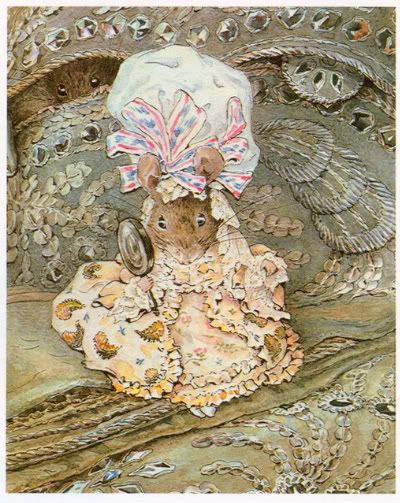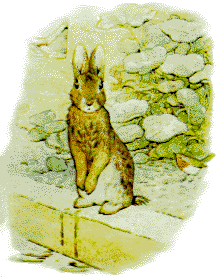
from THE TAILOR OF GLOUCESTER by Beatrix Potter
(Frederick Warne & Co., Inc., 1903)
"Thank goodness I was never sent to school; it would have rubbed off some of the originality."
 ~ Beatrix Potter (July 28, 1866 - December 22, 1943)
~ Beatrix Potter (July 28, 1866 - December 22, 1943)
**BONUS RECIPE in honor of Miss Potter's birthday:
FIERCE BAD RABBIT'S CARROT-RAISIN SALAD
(serves 4)
2 carrots
2 apples
1 rib of celery
1/2 cup raisins
1/4 tsp salt
1 tsp lemon juice
1/2 cup mayonnaise, sour cream, or yogurt
1/4 cup chopped nuts, optional
lettuce leaves
Wash the carrots and scrape with a vegetable peeler. Place a metal grater on a piece of wax paper and grate the carrots, using the large ice-cream-cone-shaped openings of the grater. Put the grated carrots in the mixing bowl.
Wash the apples, but do not peel them. Cut them in half and then in quarters. Cut out the core, and cut the apples into small pieces.
Wash the celery and chop it. Add the celery, apples, and raisins to the carrots. Sprinkle with salt and lemon juice. Stir in mayonnaise, sour cream, or yogurt.
Serve the salad on lettuce leaves and sprinkle with nuts if you like them.
~adapted from Peter Rabbit's Natural Foods Cookbook by Arnold Dobrin (Frederick Warne & Co., 1977).
Viewing: Blog Posts Tagged with: thought for the week, Most Recent at Top [Help]
Results 1 - 11 of 11
Blog: jama rattigan's alphabet soup (Login to Add to MyJacketFlap)
JacketFlap tags: carrot raisin salad, beatrix potter, thought for the week, Add a tag
Blog: jama rattigan's alphabet soup (Login to Add to MyJacketFlap)
JacketFlap tags: thought for the week, john lee, Add a tag

As children, we played freely with sound and expression. But somewhere along the way we began editing what came naturally to us. We heard others tell their stories differently; we noticed the praise they got. Or we watched stories played out on television and concluded that they were more exciting than what we had made up on our own. Gradually, subtly, we began to hold things in, instead of turning them loose into the world. And our precious energy went the way of the kingdoms, and the angels. The trolls stayed on; they just changed form -- appearing as anger, sadness, guilt, frustration, fear. These trolls went into our bodies to hide; and all the criticisms we heard and believed about ourselves marched in right behind them.
We want to become as free to create as we were in childhood. We know that what we have to tell is unique, unike what anyone else would reveal. To do this, we must be willing to give voice to the dusty collection of disappointments and anxieties that crowd our inner territory.
So much of creativity is an attempt to retranslate the most closely guarded stories of our lives. The insistent archaeologist within us demands that we detect our own tension, stress, and distress and trace them back to their origins. As Marion Woodman observes, "Powerful energies are locked in our bodies." If we do not discharge the pressures stored in our muscles and tissues, in our backs, our faces, throats, and bellies, in our arms and legs, then the energy gets stuck. When we don't release these tensions, we often end up in a breathless effort to talk them out or write them out, when it would have been easier to stretch, sigh, shout, pound, punch, or dance them out in the beginning.
~ John Lee, Writing from the Body (St. Martin's Press, 1994) 
Blog: jama rattigan's alphabet soup (Login to Add to MyJacketFlap)
JacketFlap tags: jane hirshfield, thought for the week, Add a tag

A good poem always has some entrance into and reminder of the fact that genuine experience is unexpected. A good poem shocks us awake, one way or another -- through its beauty, its insight, its music; it shakes or seduces the reader out of the common gaze and into a genuine looking. It breaks the sleepwalking habit in our eyes, in our ears, in our mouths, and sets us adrift in a small raft under a vast night-sky of stars. We feel ourselves moving, too, above a vast, cold-streaming current carrying inner-lit sea creatures, tangles of kelp strands, fishes. Thus we learn the deep clefts of the mid-ocean land-rifts; thus the wave-blanketed mountains rise up before us as islands, a new habitation for heart and mind . . . We depart the known ease in order to arrive somewhere other than where we were. We travel by poem, as by any other means, in order to see for ourselves more than was seen.
~ Jane Hirshfield, "The Shock of Good Poetry,"
The Writer, June 1999.
Blog: jama rattigan's alphabet soup (Login to Add to MyJacketFlap)
JacketFlap tags: thought for the week, ursula k. le guin, Add a tag

"As a writer you are free. You are about the freest person that ever was. Your freedom is what you have bought with your solitude, your loneliness." ~ Ursula K. Le Guin
Blog: jama rattigan's alphabet soup (Login to Add to MyJacketFlap)
JacketFlap tags: thought for the week, susan shaughnessy, Add a tag

"As you work further, you are faced more and more with the fact that it's not going to be everything. You try to make this as good as it can be, but it's not going to encompass the whole world. That's where the disillusionment sets in."
~ Mona Simpson
Perfectionism paralyzes writers. Sooner or later, you come to terms with the fact that your work will not be all that you hoped and imagined.
This is as it should be. NO writing should commence without broad dreams and high ambitions.
Let the scaling down come as you work, not before.
Your work, patiently pursued, will ground itself of its own accord. It will gradually show you its limitations and compromises. Because we are humans, no perfectly achieved project is possible or even desirable.
Disillusion is a natural stage that follows the holding of an illusion. How could you start a large project without an
illusion -- an image of what it might be? How could you complete it without a gradual coming down to earth?
Don't make your compromises and adjustments in advance. Let them come as you work.
~ from Walking on Alligators: A Book of Meditations for Writers
by Susan Shaughnessy (Harper, 1993)
Blog: jama rattigan's alphabet soup (Login to Add to MyJacketFlap)
JacketFlap tags: thought for the week, Add a tag

"For in addition to following the cycles of life, I chronicle it. While there is not a typewriter, telephone, dictionary, or cool glass of lemonade by my hand, I have learned that wherever I am, I must tender that other life, the one of observation, play, imprint and desire that walks with me across the rolling hills beneath the shadows of the clouds. Like the young shoots that thrive in our alkaline soil, the words of my mind must be planted, hoed, watered, thinned and weeded to yield a bumper crop." ~ Wanda Rosseland
Blog: jama rattigan's alphabet soup (Login to Add to MyJacketFlap)
JacketFlap tags: amy tan, thought for the week, Add a tag

"Language is the tool of my trade, and I use them all -- all the Englishes I grew up with."
"Who knows where inspiration comes from. Perhaps it arises from desperation. Perhaps it comes from the flukes of the universe, the kindness of the muses."
"I am like a falling star who has finally found her place next to another in a lovely constellation, where we will sparkle in the heavens forever."
~ Amy Tan, American novelist
Blog: jama rattigan's alphabet soup (Login to Add to MyJacketFlap)
JacketFlap tags: thought for the week, maya lin, Add a tag

"I probably spent the first 20 years of my life wanting to be as American as possible. Through my 20's, and into my 30's, I began to become aware of how so much of my art and architecture has a decidedly Eastern character."
"Sometimes you have to stop thinking. Sometimes you shut down completely. I think that's true in any creative field."
"How we are using up our home, how we are living and polluting the planet is frightening. It was evident when I was a child. It's more evident now."
~ Maya Lin, American Artist, Sculptor, Architect
Blog: jama rattigan's alphabet soup (Login to Add to MyJacketFlap)
JacketFlap tags: thought for the week, rilke, Add a tag

"Works of art are of an infinite loneliness and with nothing to be so little reached as with criticism. Only love can grasp and hold and fairly judge them." ~ Rainer Maria Rilke (1875-1926)
Blog: jama rattigan's alphabet soup (Login to Add to MyJacketFlap)
JacketFlap tags: buddha, thought for the week, Add a tag

"The perfume of sandalwood, the scent of rosebay and jasmine, travel only as far as the wind. But the fragrance of goodness travels with us through all the worlds. Like garlands woven from a heap of flowers, fashion your life as a garland of beautiful deeds." ~ Buddha
Blog: So many books, so little time (Login to Add to MyJacketFlap)
JacketFlap tags: ann packer, Add a tag
I review mysteries, thrillers, YA with a NW focus, and the occasional work of literary fiction in the Oregonian. I really liked Songs Without Words. Some reviewers seem to have wanted more action, but to me it was one of the "realest" books I've ever read.
It's the story of two women who were friends in high school, to the point that one family takes the other girl in after her mother commits suicide. Suicide and mental illness are themes that runs all through the book, and there were times I was afraid to read it because I was worried about the characters.
Read my review here .
Subscribe with
JacketFlap's
Children's
Publishing
Blog Reader
">here.</a>


